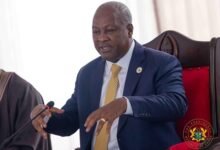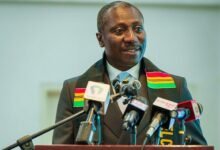
THE Minority Caucus in Parliament has rang the alarm bell over what it said was “the ever rising and crippling debt” in the energy sector.
The caucus claimed President Nana Addo Dankwa Akufo-Addo, had not only failed to appraise Ghanaians on the accumulating debt, but had at various fora, “sought to mislead the public about the exact state of affairs in the sector.”
At a press conference in Parliament yesterday, the opposition National Democratic Congress lawmakers said contrary to claims by President Akufo-Addo that the John Mahama-led administration left a debt of US$5 billion, the actual debt before it exited power in January 2017 was US$2.2 billion.
The caucus is thus demanding that President Akufo-Addo provide further and better particulars on his claim that he inherited a debt of US$5.2 billion in the energy sector.
President Akufo-Addo, addressing Ghanaians in Toronto, Canada, earlier this month said his government inherited a US$5.2 billion energy sector debt half of which has been paid, “while the remainder hanged on the neck of his administration like an albatross.”
Disputing this claim, however, the Caucus said President Akufo-Addo was “not only dishonest” as he, at the 2017 State of the Nation Address, had said that “the power sector debt stood at $2.4 billion at end 2016” but was compounding the debt portfolio of the sector.
Addressed by the Minority Spokesperson on Energy and Member for Damango, Adam Mutawakilu, the caucus said the US$2.4 billion down to US$2.2 billion debt was not a creation of the John Mahama-led administration but an accumulation by successive governments between the years 1992 and 2015.
According to the lawmakers, at the exit of the John Mahama-led National Democratic Congress administration, US$250 million out of the $2.4 billion was paid to banks to ease the liquidity crunch.
“Today, the Minority Caucus is unable to accept the President’s claim of US$5.2 billion energy sector debt created by former President Mahama during his tenure,” Mr Mutawakilu stated adding that the balance was “certified and agreed to be settled within three – five years starting from 2016, with the passage of Energy Sector Levies Act 2015, Act 899 (ESLA).”
On the debt build-up, Mr Mutawakiku said at the end of 2016, almost all the state-owned enterprises (SoEs) in the energy sector which reported profits were now making losses.
For example, he said, in 2016 the Ghana Grid Company, the Electricity Company of Ghana and the Northern Electricity Distribution Company which posted profits of GH¢69 million, GH¢725 million and GH¢1.19 million respectively, were now recording GH¢118 million, GH¢2 billion and GH¢163.7 million losses respectively.
The government, Adam Mutawakilu said was indebted to Karpower, US$150 million, ENI, US$160 million, NEDCo, US$162 million, Independent Power Producers, US$1 billion, GRIDCo, US$171 billion and Ghana Gas US$735 million.
“This huge debt overhang is adversely affecting the viability and operations of the country’s energy sector companies and hindering their ability to function effectively and provide quality service to Ghanaians,” the Damango MP stressed.
He called on President Nana Akufo-Addo to take responsibility and address the liquidity and operational challenges in the country’s energy sector instead of “carrying on with his nauseating blame game.”
“The President must show clearly how he intends to revive entities like the Tema Oil Refinery (TOR), and the Bulk Oil Storage and Transportation Company Limited (BOST); which were fully operational when former President John Dramani Mahama handed over to him in January 2017.”
BY JULIUS YAO PETETSI







